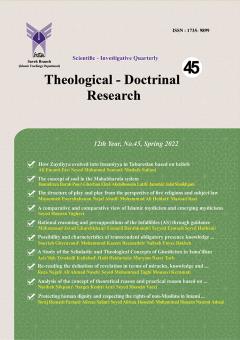-
-
List of Articles
-
Open Access Article
1 - How Zaydiyya evolved into Imamiyya in Tabarestan based on beliefs
ali emamifar Seyed Mahmoud Samani mostafa soltani -
Open Access Article
2 - The concept of soul in the Mahabharata system
Hamidreza Barati Pour Ghorban Elmi Abdolhossein Latifi Jamshid Jalal Sheikhjani -
Open Access Article
3 - The structure of play and play from the perspective of five religions and subject law
Masoumeh Pourshabanan Najaf Abadi mohammad ali hedari Masoud Raee Dehghi -
Open Access Article
4 - نگاه تطبیقی و مقارنهای به عرفان اسلامی و عرفانهای نوظهور
Seyyed Hossein Taghavi -
Open Access Article
5 - Rational reasoning and presuppositions of the Infallibles (AS) through guidance
Mohammad Javad Gharehkhani Esmaeil Darabkolohi mohamad esmaeil said hashemi -
Open Access Article
6 - Possibility and characteristics of transcendent obligatory presence knowledge from Ibn Arabi's point of view
Souriah Gheravand Mohammad Kazem Rezazadeh Joudi Nafiseh Fayaz Bakhsh -
Open Access Article
7 - A Study of the Scholastic and Theological Concepts of Gnosticism in Isma'ilism (Imamate and the interpretive and esoteric realm of the Holy Word)
Maryam Naser Tork Aziz’lla h Tavakolli Kafiabad Hadi Heidarinia -
Open Access Article
8 - Re-reading the definition of revelation in terms of miracles, knowledge and infallibility of the prophets
Reza Najafi Ali Ahmad Naseh seyed mohammad taghi mosavi keramati -
Open Access Article
9 - Analysis of the concept of theoretical reason and practical reason based on Islamic approach
Nasibeh Nikpoor Narges Keshtiaray hosein vaezi -
Open Access Article
10 - Protecting human dignity and respecting the rights of non-Muslims in Imami jurisprudence and subject law
Toraj Hematti Farsani Alireza Salimi ALIREZA HOSSINI Mohammad Hossein Nazemi Ashani
-
The rights to this website are owned by the Raimag Press Management System.
Copyright © 2017-2026







